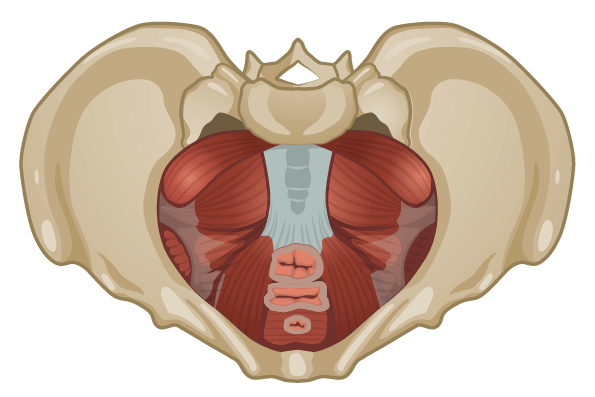Back
Should I Strengthen or Stretch My Pelvic Floor?
By Dr. Christine Martirez PT, DPT on 3/12/2024

The journey to optimal pelvic floor health is a path of balance—between strength and flexibility, exertion and relaxation. This delicate equilibrium is crucial for a range of bodily functions, from maintaining continence to enjoying sexual health and facilitating childbirth. In this blog post, we delve into the world of the pelvic floor, exploring its functions, the importance of both strengthening and stretching, and how we as pelvic floor physical therapists play a pivotal role in guiding this process.
Understanding the Pelvic Floor
The pelvic floor is a complex network of muscles, ligaments, and connective tissues located at the bottom of the pelvis. This muscular hammock supports the bladder, uterus (in females), prostate (in males), and rectum, playing a pivotal role in several critical bodily functions, including:
Supporting abdominal and pelvic organs...
preventing prolapse (the downward descent of pelvic organs).
Controlling bladder and bowel movements...
contributing to urinary and fecal continence.
Facilitating sexual function...
by maintaining blood flow and erections, and contributing to sexual sensation and orgasm.
Assisting in childbirth...
by stretching to allow for the passage of the baby.

The Dance of Strengthening and Stretching
Strengthening the Pelvic Floor:
Strong pelvic floor muscles are vital for supporting the pelvic organs, maintaining continence, and enhancing sexual function. Exercises such as Kegels are well-known for their ability to strengthen these muscles by contracting and relaxing them. However, like any other muscles, overemphasis on strengthening without adequate attention to flexibility can lead to tension and dysfunction.Stretching the Pelvic Floor:
Stretching and relaxing the pelvic floor muscles are equally important. A flexible pelvic floor can help alleviate issues such as chronic pelvic pain, sexual dysfunction, and difficulties with bowel movements. Techniques to stretch and relax the pelvic floor include diaphragmatic breathing, yoga, and specific pelvic floor relaxation exercises. A muscle needs to have optimal length in order to generate force.
The Role of Pelvic Floor Physical Therapists
Pelvic floor physical therapists can assess and treat various conditions related to pelvic floor dysfunction. We are skilled in guiding individuals through the process of both strengthening and stretching the pelvic floor muscles, depending on the individual's needs. Our expertise includes:
Personalized Assessment:
Understanding whether the pelvic floor muscles are too weak, too tight, or if there's a combination of both issues.
Customized Treatment Plans:
Creating tailored exercises that focus on either strengthening or stretching the pelvic floor muscles—or often, a combination of both.
Education and Guidance:
Teaching correct techniques for exercises, providing lifestyle recommendations, and educating on how to maintain pelvic floor health.
How We Guide the Process
A pelvic floor physical therapist begins with a thorough assessment, which can include a manual examination to evaluate muscle tone, strength, and flexibility. Based on this assessment, we might recommend:
For a Weak Pelvic Floor:
A regimen focusing on strengthening exercises to build muscle tone and support.
For an Overly Tight Pelvic Floor:
A program emphasizing relaxation and stretching exercises to increase muscle flexibility and reduce discomfort.
Balanced Approach:
For many, a combination of both strengthening and stretching exercises is necessary to achieve optimal pelvic floor health.
Reach Out to Us
Understanding and caring for your pelvic floor is a critical component of your overall health and well-being. Whether your pelvic floor requires strengthening, stretching, or a balanced approach between the two, a pelvic floor physical therapist can provide the expertise and guidance needed to navigate this journey. By embracing both aspects of pelvic floor care, you can achieve the harmony necessary for optimal function and quality of life.
If you are unsure what to do to address your pelvic floor symptoms, please reach out to us at Pelvic Health Center in Madison, NJ to set up an evaluation and treatment! Feel free to call us at 908-443-9880 or email us at receptionmadison@pelvichealthnj.com.
Read More:
How Chronic Pelvic Congestion in Men Contributes to Prostatitis By Shannon Strauch, PTA, STMT-1 on 12/11/2024 How lymphatic issues can cause symptoms of prostatitis Prostatitis and Tight Pelvic Floor Muscles: A Comprehensive Guide By Shannon Strauch, PTA, STMT-1 on 12/10/2024 How a tight pelvic floor can be the reason for prostatitis symptoms
Are you ready to live pain free?
Request An Appointment